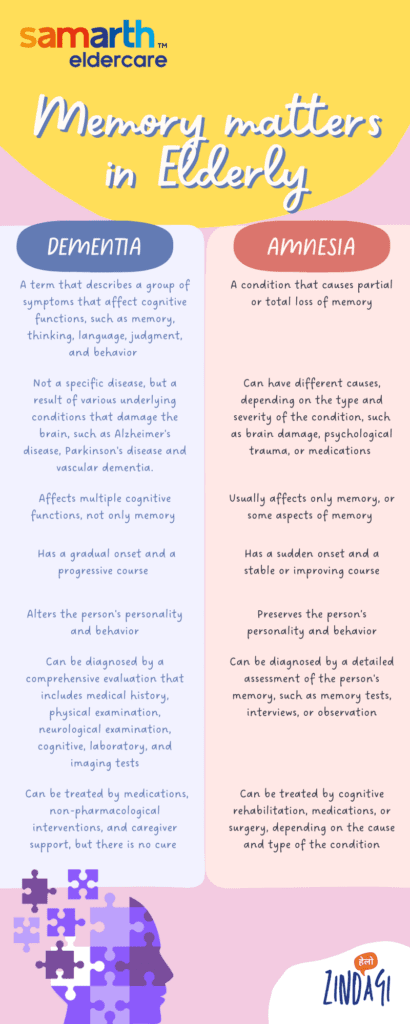Introduction
Manoj, a former colleague and dear friend called me a few days back asking me if we supported elderly who have dementia. I said of course we do. His father was developing dementia and he was thinking of getting help for him. I have known Manoj’s father for several years. He is a mild-mannered person, lost his wife about 10 years ago, and lives with Manoj’s family. I was curious to know how he developed dementia and importantly, how bad was it. Manoj said his father was forgetting to turn off the lights when he left any room in the house, and so he was convinced that this was the onset of dementia. He had seen his grandfather suffer from what was thought to be dementia and was keen to catch it early.
The discussion brought to the fore a fear which many of us have regarding our aging parents – that of their mental and cognitive health. We have all seen or heard cases of how cognitive impairment badly affected not only the patient but also the family and would like to do everything possible to avoid that situation for our dear ones. In this article, we explain the conditions related to memory loss and impairment and the differences between forgetfulness, amnesia, and dementia.
The Reality of Memory Loss in the Elderly
Age affects memory in many ways. Many of us feel the affect ourselves, occasionally forgetting names or misplacing things.
Understanding the Prevalence: Statistics and Facts
The fear of dementia is not unfounded, due both to its prevalence and its consequences. Currently, more than 55 million people in the world have dementia. Alzheimer’s disease is the most common form of dementia and may contribute to 60–70% of cases. Every year, there are nearly 10 million new cases. Dementia is also the seventh leading cause of death and one of the major causes of disability and dependency among older people globally. Women are disproportionately affected by dementia, both directly and indirectly. In India, 7.5% of the adults aged 60+ are estimated to suffer from dementia even though it is also significantly under-reported.
It is important to understand that all memory issues in the elderly are not related to dementia. The situation could range from simple forgetfulness to amnesia or dementia. Each of these needs to be addressed differently.
Forgetfulness
For most elderly, occasional lapses in short-term memory are normal and do not necessarily signal serious mental deterioration or the onset of Alzheimer’s or other forms of dementia.
Certain common types of memory lapses among older adults which are generally not considered warning signs of dementia include occasionally forgetting where you left things you use regularly or walking into a room and forgetting why you entered, forgetting or substituting names of people, or not being able to retrieve the information you have “on your tips”. These memory lapses have little impact on the elderly’s daily performance and ability to do what they want to do. Memory aids such as memos, diaries, flashcards, and planners will usually be enough to help the elderly manage memory lapses in daily life.
Worried about your Elderly parents back home?
Call us today to arrange Care Like Son and Daughter™.
Amnesia vs Dementia: Understanding the Terms
Although both dementia and amnesia are disorders of the brain, they are not the same. Amnesia primarily affects memory without any other cognitive impairment, but dementia affects all higher brain processes. Unlike age related forgetfulness, and dementia related memory loss, amnesia can be reversible.
The World of Amnesia
Amnesia Uncovered: Types and Symptoms
Amnesia is a condition that causes partial or total loss of memory. It can affect a senior’s ability to remember events, facts, people, or skills. Amnesia can be temporary or permanent, depending on the cause and severity of the condition.
There are two main types of amnesia: anterograde and retrograde. Anterograde amnesia is the inability to form new memories after a certain point in time, such as after a head injury or a stroke. People with anterograde amnesia may have difficulty learning new information, remembering recent events, or recognizing new people. Retrograde amnesia is the inability to recall past memories before a certain point in time, such as after a surgery or a drug overdose. People with retrograde amnesia may have difficulty remembering their personal history, past events, or familiar people.
Some of the common symptoms of amnesia are:
- Confusion or disorientation
- Repeating oneself or asking the same questions
- Forgetting names, dates, or places
- Having gaps or distortions in memory
- Inventing or fabricating memories to fill in the blanks
- Having difficulty performing familiar tasks or skills
The Human Side of Amnesia
Amnesia is not only a medical condition. It can affect the person’s sense of self, identity, and relationships and experience. People with amnesia may feel frustrated, confused, or isolated by their memory loss. They may struggle to remember who they are, where they come from, or what they have done. Amnesia can also impact the person’s family, friends, and caregivers, who may have to adjust to the changes in the person’s personality, behavior, and needs. They may have to provide constant support, guidance, and reassurance to the person with amnesia. They may also have to cope with their own emotions, such as grief, anger, or guilt. People with amnesia and their loved ones can find ways to cope with the condition, such as seeking professional help, joining support groups, creating memory aids, or finding new hobbies and interests.
The Complexity of Dementia
Dementia Demystified: Variants and Symptoms
The word dementia describes a group of symptoms that affect cognitive functions, such as memory, thinking, language, judgment, and behavior. Dementia is not a specific disease, but a result of various underlying conditions that damage the brain. Some of the common variants of dementia are:
- Alzheimer’s disease: The most common cause of dementia, it is caused by the buildup of abnormal protein deposits and neurofibrillary tangles in the brain. These impair the communication and function of brain cells. The symptoms of Alzheimer’s disease include memory loss, confusion, disorientation, difficulty with language, mood changes, and behavioral problems.
- Vascular dementia: The second most common cause of dementia, it is caused by reduced blood flow to the brain, due to conditions such as stroke, transient ischemic attack, or atherosclerosis. The symptoms of vascular dementia, but may include memory loss, difficulty with planning, reasoning, or problem-solving, impaired judgment, and personality changes.
- Lewy body dementia: The third most common cause of dementia, it is caused by the accumulation of abnormal protein clumps called Lewy bodies in the brain. The symptoms include fluctuating cognition, visual hallucinations, delusions, sleep disturbances, movement disorders, and sensitivity to medications.
- Frontotemporal dementia: A rare cause of dementia, it is caused by the degeneration of the frontal and temporal lobes of the brain, which are responsible for personality, behavior, language, and emotion. The symptoms of frontotemporal dementia may include changes in personality, behavior, or social skills, loss of empathy, disinhibition, apathy, compulsions, or language problems.
Dementia is progressive, meaning that it worsens over time and affects more and more areas of the brain.
Distinguishing Amnesia and Dementia
Amnesia and dementia are both memory disorders, but they have different characteristics and effects on the person’s life. Some of the main differences between amnesia and dementia are:
- Amnesia usually affects only memory, while dementia affects multiple cognitive functions
- Amnesia usually has a sudden onset, while dementia usually has a gradual onset
- Amnesia usually has a specific cause, while dementia usually has a complex or unknown cause
- Amnesia usually has a stable or improving course, while dementia usually has a deteriorating course
- Amnesia usually preserves the person’s personality, while dementia usually alters the person’s personality

Navigating Diagnosis and Treatment
-
The Path to Diagnosis: Tests and Considerations
The diagnosis of dementia is based on the combination of the results of several tests, as well as the clinical judgment of the doctor. The diagnosis may take several visits and consultations, as dementia can be difficult to distinguish from other conditions that affect the brain and memory. A doctor will perform a comprehensive evaluation to diagnose dementia, that includes:
-
- Medical history: The doctor will ask about the person’s symptoms, onset, duration, severity, and impact on daily life as well as the person’s family history, and lifestyle factors that may affect the brain function and memory.
- Neurological examination: The doctor will test the person’s reflexes, coordination, balance, and sensory functions and may also look for signs of Parkinson’s disease, Alzheimer’s disease, or other disorders that may cause dementia.
- Cognitive tests: The doctor may use standardized tests, such as the Mini-Mental State Examination (MMSE), or ask the person to perform simple tasks, such as naming objects, drawing shapes, or repeating words.
- Neuropsychological tests: The doctor may refer the person to a neuropsychologist, who will conduct more detailed and specialized tests.
- Laboratory tests: The doctor may order blood tests, urine tests, or spinal fluid tests to check for infections, inflammations, metabolic disorders, vitamin deficiencies, or genetic markers that may cause dementia.
- Imaging tests: The doctor may order brain scans such as CT, MRI and PET to visualize the structure and function of the brain and look for signs of brain damage, that may indicate the type and cause of dementia.
The diagnosis may also change over time, as dementia is progressive and may affect different areas of the brain.
-
Treatment Horizons: Emerging Therapies and Established Approaches
Amnesia and dementia have different treatments, depending on the type and cause of the condition. Some of the common treatments for amnesia are:
-
- Cognitive rehabilitation or therapy that helps the person improve their memory skills and cope with their memory loss
- Medications or drugs that enhance memory function or reduce memory impairment, such as cholinesterase inhibitors, memantine, or stimulants
- Surgery or electrical stimulation that repairs or stimulates the damaged brain regions or circuits involved in memory
Some of the common treatments for dementia are:
-
- Medications or drugs that slow down the progression of the disease or manage the symptoms, such as cholinesterase inhibitors, memantine, antipsychotics, or antidepressants
- Non-pharmacological interventions that support the person’s cognitive, physical, and emotional well-being, such as cognitive stimulation, exercise, music therapy, or social interaction
Caregiver support and education that helps the person’s family and friends understand and cope with the condition and provide the best possible care
Daily Life with Memory Disorders
-
Adaptive Strategies for Caregivers and Patient
While interventions such as the ones listed earlier may help delay the progression of dementia, care givers must also embrace strategies to cope with caring for affected elderly. These include:
-
- Setting realistic goals and expectations
-
- Seeking help and support
-
- Anticipate misinterpretation by the patient
-
- Reminiscing about the past with the senior
-
- Being flexible
It is also worthwhile evaluating the senior’s need for support especially since the primary caregiver in many cases would be the elderly spouse. One should ask question such as:
-
- Do they have the ability to handle emergencies on their own?
- Can they use appliances safely?
- Are they able to safely answer the phone or door when left alone?
- Is the patient likely to harm him/herself?
You can also modify the environment to limit the possibilities of potentially dangerous situations.
Risk Factors for Amnesia and Dementia
Memory loss and cognitive decline can result from a variety of factors, ranging from neurological conditions to lifestyle influences. Amnesia, which involves partial or complete memory loss, can be triggered by brain damage, sleep disorders, or nutritional deficiencies. Dementia, on the other hand, is a progressive condition that affects memory, thinking, and behavior, often caused by neurodegenerative diseases and cardiovascular problems. Understanding the risk factors for both conditions can help in early detection, prevention, and management.
Amnesia Risk Factors
• Neurodegenerative Diseases
• Stroke
• Sleep Disorder
• Nutritional Deficiencies
• Aging
Dementia Risk Factors
• Genetic & family history
• Cardiovascular Issues
• Diabetes
• Chronic Stress
• Social Isolation
How Samarth Can Help: Your Next Steps in Elder Memory Care
Navigating the complexities of amnesia and dementia can be challenging, but you don’t have to do it alone. Samarth Elder Care is your partner in this journey, offering expertise and empathy at every step.
Take the first step towards understanding and managing memory conditions. We can organise a, no-obligation consultation. Our experienced team at Samarth Elder Care is ready to listen to your concerns, answer your questions, and provide personalized guidance as well as support you and your family in caring for your elderly. Click here to Request for Discussion.







